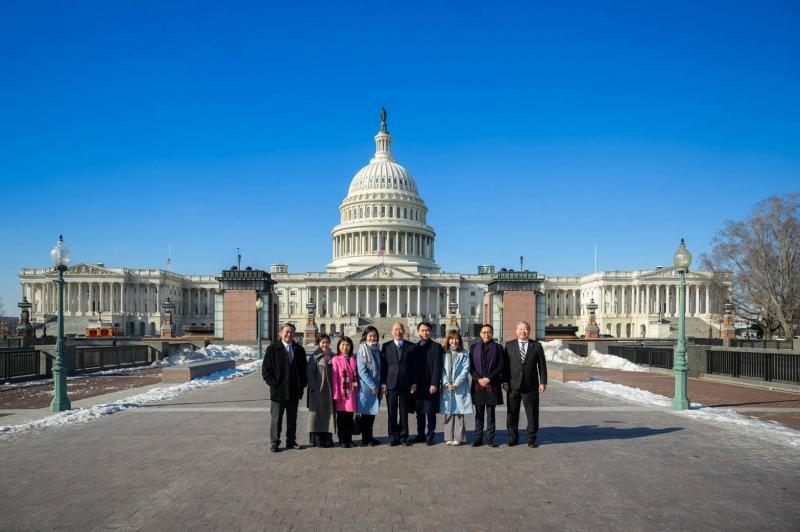Legislative Speaker Han Kuo-yu (韓國瑜) said yesterday that the cross-party delegation to the US led by him has maintained a united front and he was pleased to see bipartisan support for Taiwan among members of the US Congress.
Speaking to Taiwanese reporters the day before the delegation's four-day visit ended, Han said some Taiwanese expatriates were worried about whether he and his delegation would be able to watch the inauguration of US President Donald Trump, as the Jan. 20 ceremony had been moved indoors because of cold weather.
Due to space limitations in the Capitol Rotunda where the ceremony was held, the Taiwan delegation could not attend in person, but the members were able to watch it on large screens at nearby locations, Han said.

Photo courtesy of the Legislative Yuan
Han said he and Taiwan's representative to the US Alexander Yui (俞大㵢) joined other guests at the Capitol Visitor Center, called Emancipation Hall, to watch the inauguration ceremony on a large screen.
The other members of the Taiwan delegation — seven cross-party lawmakers — watched a livestream in a VIP area of the Capital One Arena, just over a mile from the Capitol Building, Han said.
Those arrangements were made through the efforts of Taiwan's Ministry of Foreign Affairs and its representative office in the US, he added.
After Trump's swearing-in ceremony, he went to Emancipation Hall to give a short speech, Han said, adding that he and Yu were standing no more than 25 meters away from the US president.
While in Washington, Han said, his delegation met with a number of Trump administration officials in charge of Taiwan and Asian affairs.
The delegation also visited think tanks affiliated with both the US Democratic and Republican parties to discuss Taiwan-US relations and future bilateral cooperation, Han said.
The discussions covered areas such as security, technology, business, education and culture, he said.
"All members of the delegation feel that there is strong bipartisan support in the US Congress for Taiwan," Han said.
According to Taiwan's representative office in the US, the delegation met with 24 members of the US Congress in total, including Ted Cruz, chairman of the Senate Committee on Commerce, Science, and Transportation; and Michael McCaul, chairman of the House Foreign Affairs Committee.
Meanwhile, the exchanges among the eight members of his cross-party delegation remained cordial throughout the trip, Han said.
Han added that he and the seven other lawmakers from three different parties presented a unified front in pushing for closer Taiwan-US exchanges.
The delegation comprised Han from the main opposition Kuomintang (KMT); lawmakers Wang Ting-yu (王定宇), Chen Kuan-ting (陳冠廷) and Kuo Yu-ching (郭昱晴) of the ruling Democratic Progressive Party; Ko Chih-en (柯志恩), Lee Yen-hsiu (李彥秀) and Ko Ju-chun (葛如鈞) of the KMT; and Chen Gau-tzu (陳昭姿) of the smaller opposition Taiwan People's Party.
They all expressed hope that the unity among themselves could be maintained when they return to Taiwan, where their parties have been wrangling in the Legislature for months over various issues.
The delegation is scheduled to depart from the US late Thursday and arrive in Taiwan the following day.

Chinese Nationalist Party (KMT) Chairman Eric Chu (朱立倫), spokeswoman Yang Chih-yu (楊智伃) and Legislator Hsieh Lung-chieh (謝龍介) would be summoned by police for questioning for leading an illegal assembly on Thursday evening last week, Minister of the Interior Liu Shyh-fang (劉世芳) said today. The three KMT officials led an assembly outside the Taipei City Prosecutors’ Office, a restricted area where public assembly is not allowed, protesting the questioning of several KMT staff and searches of KMT headquarters and offices in a recall petition forgery case. Chu, Yang and Hsieh are all suspected of contravening the Assembly and Parade Act (集會遊行法) by holding

PRAISE: Japanese visitor Takashi Kubota said the Taiwanese temple architecture images showcased in the AI Art Gallery were the most impressive displays he saw Taiwan does not have an official pavilion at the World Expo in Osaka, Japan, because of its diplomatic predicament, but the government-backed Tech World pavilion is drawing interest with its unique recreations of works by Taiwanese artists. The pavilion features an artificial intelligence (AI)-based art gallery showcasing works of famous Taiwanese artists from the Japanese colonial period using innovative technologies. Among its main simulated displays are Eastern gouache paintings by Chen Chin (陳進), Lin Yu-shan (林玉山) and Kuo Hsueh-hu (郭雪湖), who were the three young Taiwanese painters selected for the East Asian Painting exhibition in 1927. Gouache is a water-based

Taiwan would welcome the return of Honduras as a diplomatic ally if its next president decides to make such a move, Minister of Foreign Affairs Lin Chia-lung (林佳龍) said yesterday. “Of course, we would welcome Honduras if they want to restore diplomatic ties with Taiwan after their elections,” Lin said at a meeting of the legislature’s Foreign Affairs and National Defense Committee, when asked to comment on statements made by two of the three Honduran presidential candidates during the presidential campaign in the Central American country. Taiwan is paying close attention to the region as a whole in the wake of a

OFF-TARGET: More than 30,000 participants were expected to take part in the Games next month, but only 6,550 foreign and 19,400 Taiwanese athletes have registered Taipei city councilors yesterday blasted the organizers of next month’s World Masters Games over sudden timetable and venue changes, which they said have caused thousands of participants to back out of the international sporting event, among other organizational issues. They also cited visa delays and political interference by China as reasons many foreign athletes are requesting refunds for the event, to be held from May 17 to 30. Jointly organized by the Taipei and New Taipei City governments, the games have been rocked by numerous controversies since preparations began in 2020. Taipei City Councilor Lin Yen-feng (林延鳳) said yesterday that new measures by